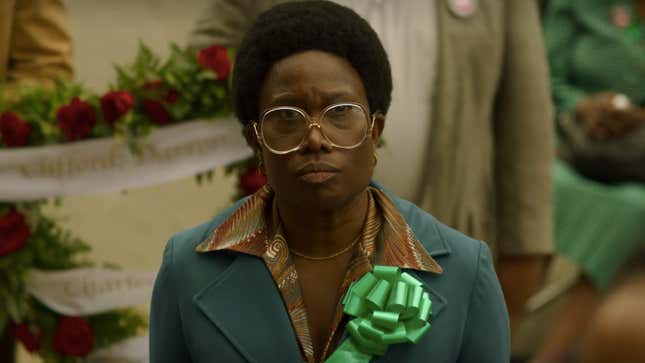
At the beginning of this season of Mindhunter, I expressed concern that the show was moving towards a tired trope in crime stories: The quasi-supernatural “they understand them because they’re like them” profiler character. Now, I’m pleased to report that I have indeed been outsmarted, and the show was setting up the trope in order to deconstruct it later in the season. That’s a roundabout way of saying that Agent Holden Ford continues to fuck up, throwing the FBI’s investigation into the Atlanta Child Murders into ever deeper disarray. Holden considers himself an expert, but he’s clearly out of his depth when it comes to navigating the racial politics of the New South. At the very least, he ought to be more aware of the optics of a white guy with a cross pushing his way through a crowd of Black marchers. For all they know, he’s about to reach for his lighter.
The cross theme in this episode was downright eye roll-inducing, especially given its connection to the already improbable scenario of Tench’s son being present at the scene of a two-year-old child’s death. I had honestly forgotten that Brian put the little boy onto a cross in an attempt to “resurrect” him, which is such a ham-fisted way of tying together the two (already well-established as connected) storylines that it took me out of the episode entirely for a while. Blame for that goes more on the show’s writers than director Carl Franklin, who took over last episode and directs the remainder of the season. Franklin’s style is a bit flashier than Andrew Dominick’s, and he tries some really interesting stuff with sound effects—I enjoyed the whistling kettle when Nancy Tench opens the front door to find the murdered boy’s mother, Mrs. Dickinson (Amanda Steinmetz), on her doorstep—and different formats—the use of film grain in the S.T.O.P. march scene gave it an interesting historical texture—in this episode.
The Christian symbolism really didn’t work for me, but I was compelled by Camille Bell’s speech in the church after Mayor Jackson (Regi Davis) got shouted down by community members at his emergency speech. There’s no real right or wrong in the situation at large: Everyone is seeing what they want to see, from the community members who want to blame an unrelated explosion on the KKK to Ford smugly rolling his eyes at the idea of investigating leads that don’t fit his pet theory. That leaves Bell to serve as the conscience of this particular story, the righteous crusader whose only concern is with the victims and their families. She knows the victims’ names; to her, they’re not just pushpins on a cork board, they’re Louie and Eric. She’s right when she says “11 Black children had to die for the city to take us seriously.” She’s the best part of this episode by a mile.
Her frustration is real, and things are only going to get more frustrating until the killer is found, particularly as Agent Barney continues to uncover gross neglect on the part of Atlanta PD in investigating these disappearances. Hopefully Ford will be able to pull his head out of his ass long enough to notice. That palpable sense of frustration is an important aspect of this story, so I do understand the narrative need to stretch the events—and the audience—nearly to their breaking point. But that doesn’t make this episode any less of a placeholder.
Stray Observations
- No serial-killer interviews this episode means no biographical facts to share. Maybe next time.
- “There’s nothing wrong with whacking off in the woods.” Finally, some sense from Ford. Considering (or so I have heard) that finding porn in the woods was a rite of passage in the pre-internet era, it shows how desperate the team is that they followed this line of questioning to begin with.
- In fairness to “the plumber,” I think a lot of people would be grossed out by someone putting their fingers in their coffee, regardless of that person’s race.
- And speaking of coffee, Jesus Christ, how much sugar does Tench put in his? He threw in three packets in the first round, then picked up three more.
- Does no one on this team eat breakfast?
- Carr continues to be pushed to the margins of the story, although I do appreciate the complexity of her dilemma of choosing between living an authentic life and doing the work she feels called to do.